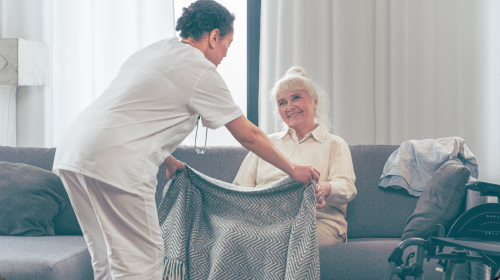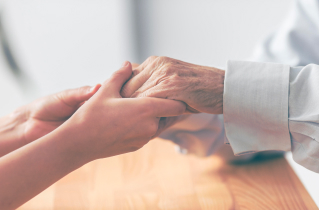NHTD Medicaid Waiver Program: Holistic Home Care Innovations Tailored for Brooklyn’s Residents
![]() Angel Care, Inc. only provides service coordinator and Home and Community Based Services, all other services are referred out.
Angel Care, Inc. only provides service coordinator and Home and Community Based Services, all other services are referred out.
Charting the vast landscape of healthcare choices for those with disabilities or chronic conditions can feel like navigating a labyrinth, leaving many overwhelmed by the intricacies and options at hand. For residents of Brooklyn and throughout New York, the NHTD (Nursing Home Transition and Diversion) Medicaid Waiver Program provides a lifeline—an empowering alternative to institutional care—allowing individuals to access critical services within the comfort of their homes and the familiarity of their communities.Backed by Medicaid, this program champions a person-centered model of care, placing the individual’s needs at the heart of its mission. It strives to elevate the quality of life for those with disabilities, all while diminishing dependence on nursing homes and other institutional environments.
What Exactly is the NHTD Medicaid Waiver Program?
The NHTD Medicaid Waiver Program, a Medicaid-funded initiative, is crafted to assist individuals in need of specialized care by facilitating their transition from nursing facilities or enabling them to bypass institutional care entirely.Rather than confining care options to conventional facilities, the program empowers eligible individuals to receive the vital services they need within the comfort of their own homes or within supportive, community-based environments.The program places a strong emphasis on independence and personal autonomy, crafting care solutions that are meticulously tailored to meet the distinct needs of each individual.

Determining Eligibility for the NHTD Waiver Program
To be considered eligible for the NHTD Medicaid Waiver Program, individuals must satisfy a defined set of criteria:
- Be an active Medicaid recipient.
- Be at least 18 years of age or older.
- Have a physical disability or be 65 years of age or older.
- Demonstrate the need for a level of care that would ordinarily be provided in a nursing home setting.
Unlocking the Benefits of the NHTD Waiver Program
The NHTD Waiver Program offers an extensive array of services, each thoughtfully designed to empower individuals to lead enriching and independent lives within their communities. These services encompass, but are not limited to:
- Service Coordination: Skilled service coordinators are dedicated to guiding participants through the intricacies of the program, ensuring seamless access to essential resources and crafting personalized care plans tailored to each individual’s unique needs.
- Structured Day Programs: These programs provide a variety of activities and services throughout the day, designed to cultivate social interaction, encourage personal growth, and enhance community engagement.
- Environmental Modifications: The program covers essential home adaptations, such as the installation of wheelchair ramps or other accessibility enhancements, transforming living spaces to better accommodate the unique mobility needs of participants.
- Assistive Technology: Participants gain access to a wide range of devices and equipment, from mobility aids to communication tools, all designed to enhance daily living and empower individuals to maintain greater independence in their routines.
- Home and Community Support: Compassionate caregivers provide essential assistance with daily tasks, such as bathing, meal preparation, and medication management, ensuring participants receive the support they need to thrive both at home and within their community.
- Counseling Services: The program also offers vital mental health support, recognizing the importance of emotional and psychological well-being in achieving holistic care and enhancing the overall quality of life for participants.
Steps to Apply for the NHTD Medicaid Waiver Program in Brooklyn
The application process for the NHTD Waiver Program in New York involves a series of essential steps:
- Obtain NHTD Waiver Program Forms: These necessary forms can be accessed through local Medicaid offices or with the assistance of service coordinators who specialize in guiding individuals through the NHTD program application process.
- Determine Eligibility: A comprehensive eligibility assessment will evaluate whether the individual meets Medicaid qualifications and requires a level of care typically provided in a nursing home setting.
- Coordinate with a Service Coordinator: Once eligibility is confirmed, participants collaborate closely with a dedicated service coordinator to develop a customized care plan that addresses their specific needs and goals.
- Develop a Service Plan: A detailed service plan is crafted, outlining the specific services and supports required. This plan is regularly reviewed and adjusted to ensure it continues to meet the participant’s evolving needs and circumstances.
The Vital Role of a Home Care Agency in the NHTD Waiver Program
Partnering with a home care agency can significantly simplify the NHTD waiver application process, ensuring a smoother experience while providing access to high-quality, individualized care tailored to each participant’s unique needs. Brooklyn-based agencies, particularly those well-versed in the specific requirements of the NHTD Waiver Program in New York, offer invaluable support through dedicated service coordinators, skilled caregivers, and professionals specially trained to address the unique needs of waiver participants. These agencies can expertly guide participants through every step of the process, from acquiring the required forms to unraveling the intricacies of the waiver, ensuring that no detail is overlooked.
Why Opt for a Brooklyn-Based Home Care Agency?
Choosing a local home care agency in Brooklyn provides NHTD program participants with distinct benefits:
- Proximity: A nearby agency ensures that caregivers and service coordinators are easily accessible, offering swift support when needed.
- Community Connections: Local agencies have deep knowledge of Brooklyn’s community resources and healthcare landscape, allowing them to connect participants with valuable supplementary services.
- Cultural Compatibility: Brooklyn’s vibrant diversity is well understood by local agencies, making them more adept at delivering culturally sensitive and tailored care that respects the unique backgrounds of participants.
The NHTD Medicaid Waiver Program serves as a vital lifeline, offering individuals in Brooklyn a gateway to greater independence and an enriched quality of life through the personalized, community-based care it provides. For individuals exploring this program, partnering with an experienced and knowledgeable home care agency can make all the difference, ensuring a seamless journey from the initial application through to ongoing care management and support. With the proper support, participants can lead fulfilling, independent lives, all while enjoying the comfort and familiarity of their own homes and thriving within their communities.
For more information or guidance on NHTD waiver program forms and eligibility requirements, feel free to connect with our experienced team Angel Care Inc. We are dedicated to supporting your path toward independence and enhanced well-being every step of the way.

As we grow older, physical abilities may diminish, making home safety an essential concern for seniors. Creating a safe living environment is vital for reducing the risk of accidents and improving the overall well-being of older adults. Here’s a thorough home safety checklist designed to help families provide a more secure and comfortable space for their elderly loved ones. Overall Home EnvironmentBegin with a thorough room-by-room evaluation to ensure safety throughout the house. A comprehensive home safety assessment for seniors should highlight any potential hazards that could lead to falls, injuries, or other accidents. Clear Walkways: Ensure that hallways, entryways, and communal areas are free from clutter. Remove cords, loose rugs, and any furniture that could block or obstruct pathways. Adequate Lighting: Install bright, easily accessible lighting in all rooms, hallways, and staircases. Use nightlights to assist with navigating safely during the night. Non-Slip Flooring: Place non-slip mats or rugs with rubber backing, especially in moisture-prone areas like the kitchen and bathroom, to help prevent falls. Smoke Detectors & Carbon Monoxide Alarms: Ensure these devices are in working condition and positioned in essential areas such as kitchens and bedrooms. Regularly test and maintain them for safety. Living Room and Common AreasSince seniors often spend considerable time in these spaces, it’s crucial to make them as safe and comfortable as possible. Secure Furniture: Position furniture to ensure stability and safety. Opt for pieces without sharp edges, and firmly anchor heavy items like bookshelves to the wall to prevent them from tipping over. Accessible Remote Controls & Phones: Keep remote controls, phones, and a list of emergency numbers easily accessible. A cordless phone or medical alert system can be vital in emergencies, providing immediate assistance when needed. Bathroom SafetyBathrooms pose a higher risk for accidents because of slippery surfaces and mobility challenges. A comprehensive home safety checklist for seniors should focus on essential modifications to enhance bathroom safety. Grab Bars: Install sturdy grab bars near the toilet, shower, and bathtub to offer extra stability and support. Make sure they are securely anchored to the wall for maximum safety. Non-Slip Mats: Use non-slip mats both inside and outside the shower or bathtub to significantly reduce the risk of slipping. Raised Toilet Seat: Consider adding a raised toilet seat to make sitting and standing easier and more comfortable for seniors. Handheld Showerhead: A handheld showerhead enables seniors to bathe while seated, reducing the chance of falls and offering greater convenience during showering. Bedroom SafetyA well-organized and secure bedroom promotes restful sleep while minimizing the risk of nighttime accidents. Bed Height: Ensure the bed is at an ideal height for easy entry and exit. If necessary, consider adding bed rails to provide extra support and prevent falls. Emergency Lighting: Use motion-sensor lights or keep a flashlight on the nightstand for quick access during nighttime bathroom visits. Clothing Storage: Arrange closets and drawers so frequently used items are within easy reach, eliminating the need for seniors to stretch, bend, or strain. Kitchen SafetyKitchens can present various hazards, especially for older adults who enjoy cooking. Minimizing fire risks and fall dangers is essential to creating a safer kitchen environment. Fire Extinguisher: Place a fire extinguisher in an easily accessible location, and make sure all household members are familiar with its proper use. Stovetop Safety: Opt for appliances equipped with automatic shut-off features to reduce the risk of fire. Store frequently used kitchen tools and ingredients within easy reach to avoid unnecessary stretching or bending. Clear Counters: Keep countertops organized and free of clutter to prevent spills and minimize the chances of accidents. Stairs and HallwaysFalls on stairs are a significant risk for seniors. Prioritize making staircases and hallways safe and easily navigable to reduce the chance of accidents. Handrails on Both Sides: Make sure staircases are equipped with sturdy handrails on both sides for added support. Consider installing a stairlift for seniors with mobility challenges. Non-Slip Treads: Add non-slip treads or secure carpeting to the stairs to help prevent slips and falls. Well-Lit Staircases: Ensure that staircases are well-illuminated, with light switches available at both the top and bottom of the stairs for easy access. Outdoor SafetyIt's essential not to neglect the exterior of the home when creating a safety checklist for seniors. Outdoor areas can pose significant risks as well. Clear Pathways: Make sure all outdoor walkways are free of cracks, uneven surfaces, or debris. These paths should be well-lit and have handrails installed where needed. Secure Entryways: Install sturdy handrails at all entrances, and ensure door locks are simple to operate for seniors with reduced dexterity. Garden and Yard Safety: Store garden tools and equipment properly to prevent tripping and ensure the yard remains a safe space for seniors. Emergency PreparednessFinally, preparing for emergencies is a crucial aspect of ensuring elderly safety at home. Emergency Contact Information: Keep a list of important emergency contact numbers clearly visible in common areas such as the kitchen or living room. Medical Alert Systems: Invest in a reliable medical alert system that seniors can use easily in case of an emergency. Regular Check-ins: Arrange for regular check-ins by a family member, neighbor, or caregiver to make sure everything is in order and the senior is safe. Conclusion At Angel Care Inc. Home Care Agency NY, we understand that a comprehensive home safety checklist is essential for helping seniors maintain their independence and security at home. By making small yet impactful adjustments, you can create a safer and more comfortable environment for your loved ones. It’s important to remember that regular home safety evaluations should be conducted to address the changing needs of elderly family members. Implementing this home safety checklist for seniors not only minimizes the risk of accidents but also offers peace of mind to both families and caregivers.

For NY residents delving into long-term care possibilities, possessing a thorough comprehension of the intricate frameworks governing nursing at home payments is of paramount importance. Nursing at home care provides indispensable assistance for those no longer capable of independent living, though the accompanying expenses can frequently prove challenging to decipher and manage. Grasping who holds responsibility for nursing home fees, exploring the diverse payment avenues, and identifying available financial assistance programs can streamline the process, ensuring that loved ones receive the pinnacle of quality care. Through What Means Are Nursing Homes Financed? Nursing homes are funded through a combination of personal financial resources, government assistance initiatives, and private insurance coverage plans. While many individuals presume that Medicare covers long-term care costs, it only offers coverage for short-term, medically necessary stays, usually following a hospital admission.Consequently, families often seek alternative avenues to finance nursing home care, including Medicaid, personal savings, long-term care insurance, or various state-funded initiatives. Who Bears the Responsibility for Covering Nursing Home Expenses? Multiple strategies exist for managing nursing home expenses, with the optimal choice varying based on an individual's financial situation, healthcare requirements, and eligibility for assistance. Below are the primary pathways for covering these costs: Private Pay: Numerous individuals begin by paying nursing home expenses out of pocket, utilizing personal savings or other financial assets. Although this approach offers the most flexibility in selecting a facility, it can swiftly evolve into a substantial financial strain. Medicare: Medicare offers coverage for a restricted number of days following a qualifying hospital stay, primarily concentrating on short-term rehabilitation rather than prolonged long-term care. It typically does not cover nursing home expenses for ongoing, custodial care requirements. Medicaid: As a joint federal and state program, Medicaid provides extensive coverage for long-term care, including nursing home expenses. It often becomes the primary funding source for residents who satisfy stringent income and asset eligibility requirements. In New York, Medicaid imposes specific criteria that must be fulfilled to qualify for nursing home care coverage. Long-Term Care Insurance: Tailored to cover the costs of long-term care services, including nursing home expenses, this insurance offers crucial financial support. However, access to this coverage is not universal, as it demands foresight and planning, with policies often subject to specific limitations outlined in their terms. Veteran’s Benefits: Veterans and their spouses may be eligible for financial assistance to help offset nursing home expenses through programs like the VA Aid and Attendance benefit or other veteran-specific support options. These benefits can significantly alleviate the financial burden, though they are contingent upon meeting eligibility requirements. Is Out-of-Pocket Payment for Nursing Homes an Unavoidable Necessity? Whether paying for nursing home care out of pocket is required largely hinges on your financial situation and eligibility for government assistance programs such as Medicaid or veteran’s benefits. Those who do not qualify for Medicaid or veterans' benefits often rely on personal savings or long-term care insurance, as standard private insurance generally does not cover nursing home costs. Seeking advice from a financial planner or elder law attorney can provide invaluable guidance on optimizing savings and assets to cover nursing home costs, while also exploring potential assistance options that may be available. Care Home Fees: Who Bears the Responsibility for Payment? For nursing home residents with limited financial means, Medicaid typically serves as the primary funding source once the necessary eligibility criteria are met. For those with higher incomes or significant assets, a spend-down may be necessary. This process entails utilizing personal resources to cover nursing home expenses until they qualify for Medicaid assistance. Medicaid planning, which may involve strategies such as restructuring assets or creating trusts, can be an invaluable tool for individuals anticipating long-term care needs, enabling them to safeguard their assets while preparing for future eligibility. Strategies for Financing Nursing Home Costs in Brooklyn Families in Brooklyn considering nursing home care options can employ various strategies to manage the associated expenses: Explore Medicaid Eligibility: For those with limited financial means, understanding Medicaid's eligibility criteria and the application process is essential. Medicaid may also cover personal care services, allowing some individuals to receive care at home rather than in a nursing facility. Consider a Nursing Home Payment Plan: Certain nursing homes provide flexible payment plans, enabling residents to distribute the costs over time. It's essential to discuss these options directly with the facility to fully understand the financial flexibility available. Examine Long-Term Care Insurance Policies: Individuals with long-term care insurance should carefully review their policy terms. Coverage can differ significantly, making it crucial to understand which services are included and any specific nursing home payment structures stipulated in the policy. Explore Veteran Benefits: Veterans and their spouses are advised to investigate VA programs that offer coverage for nursing home care and other long-term care services, potentially alleviating a significant portion of the financial burden. Nursing Home Payments: Vital Information for Families Families should recognize that while Medicare and private health insurance may cover short-term care, long-term nursing home stays are generally funded through Medicaid or personal payments. For those planning ahead, obtaining long-term care insurance or engaging in Medicaid planning can substantially ease future financial burdens. Collaborating with an experienced home care agency in Brooklyn can simplify the payment process, helping families navigate the complexities of long-term care with greater ease and confidence. Home care agencies provide invaluable guidance in navigating government programs, assisting with Medicaid planning, and managing the coordination of essential paperwork, ensuring a more seamless process for families. These agencies can also aid in applying for Medicaid, veterans' benefits, and other financial assistance programs that help offset nursing home expenses, ensuring a smooth and manageable journey for families in securing quality care. The cost of nursing home care is a significant consideration, and understanding the available payment options is crucial for obtaining the necessary care without placing an excessive financial burden on families. With careful planning, access to government assistance programs, and expert guidance from knowledgeable professionals, families in Brooklyn can confidently manage nursing home costs and make informed decisions that ensure the best possible future for their loved ones.Whether through Medicaid, private pay, or veteran benefits, gaining a comprehensive understanding of the financial landscape of nursing home payments enables families to prioritize quality care with peace of mind. If you need assistance with Medicaid applications or exploring payment options, our home care agency Angel Care Inc. is here to guide you through every step of the process, ensuring you find the best solutions for your loved one’s care. Contact our experienced team today to discuss your options and receive the dedicated support you deserve.



